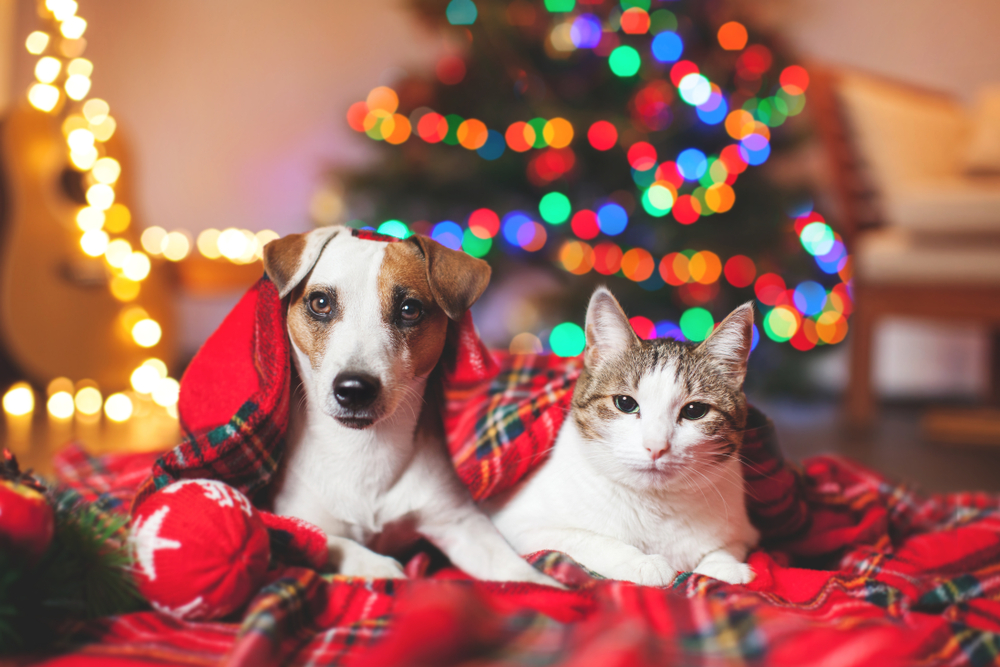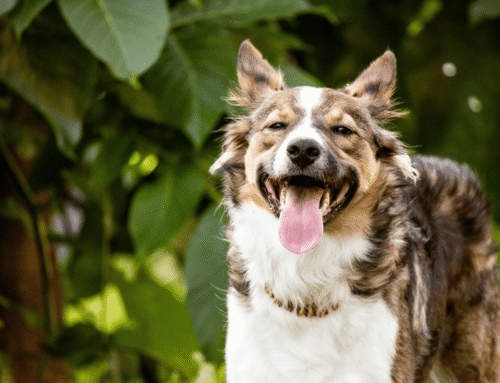During the holiday season, your pet’s safety is likely not foremost on your mind. You’ve got cooking, decorating, and shopping to which you must tend, including all the preparation for guests. Because all your holiday responsibilities and fun with family and friends can distract you from thinking about your pet’s wellbeing, your furry pal can get in trouble when their curiosity gets the best of them. To help ensure your holiday season succeeds without a hitch, read our Shuler Veterinary Clinic team’s tips to learn how to minimize your pet’s chances of having an emergency.
#1: Keep people’s food and drink away from your pet
People’s holiday foods and drinks often contain ingredients that are toxic to pets, including chocolate, raisins, grapes, macadamia nuts, garlic, onions, and the sugar-substitute xylitol. If your pet eats a toxic food, their signs can range from mild stomach upset to seizures, vomiting, coma, or death. However, nontoxic foods, such as turkey or ham, can also be dangerous because they are usually high in fat, and if your pet eats a particularly fatty piece, they can develop pancreatitis, a severe condition. Keep people’s food and drink, including alcohol, away from your pet during the holiday season.
#2: Secure your Christmas tree to prevent it from injuring your pet
If your pet is overzealous, they can easily knock over your Christmas tree, which could injure them and make a big mess with broken ornaments galore. To prevent your pet from climbing or bumping into the tree, wrap a puppy pen around the tree base, and secure the tree’s top to a wall or sturdy piece of furniture. In addition, if you have a live tree, cover the water in the base and ensure your pet cannot drink from it.
#3: Choose holiday decorations with your pet’s safety in mind
If your pet plays with or ingests certain holiday decorations, they risk being harmed. When decorating for the holidays, help ensure your pet will avoid an emergency by following these tips:
- Skip the tinsel — These shiny strands are tempting for cats and if your whiskered pal swallows a strand, they can develop a serious intestinal obstruction.
- Beware of ribbon — Ribbons can cause intestinal problems similar to the ones tinsel causes.
- Place candles wisely — If your pet knocks over a burning candle, they can be burned or cause a house fire.
- Hide electrical cords — Pets can sustain burns or shocks or cause a fire if they chew on an electrical cord. Use cord protectors or hide cords out of your pet’s reach.
- Keep snow globes off-limits — Snow globes often contain ethylene glycol, a sweet-flavored toxin that pets find irresistible. Display snow globes out of your pet’s reach to prevent your furry pal from breaking them open and lapping up the poisonous liquid.
#4: Supervise your pet around novel holiday items
Your pet will likely be curious about the new decor items in their space. For the first few days, ensure you closely monitor your furry pal as they investigate these novel items. If you cannot supervise your pet or you must leave the house, ensure you unplug electrical cords, blow out burning candles, and confine your four-legged friend to a crate or a room away from the holiday decorations.
#5: Do not decorate using pet-toxic holiday plants
If your pet chews or eats certain holiday plants, including poinsettia, holly, and mistletoe, they can develop a mouth irritation and gastrointestinal (GI) issues. Lilies are extremely toxic to cats, causing rapid—and often deadly—renal failure. Do not decorate using plants or use a faux plant if you have a curious pet. To help ensure your houseplants and floral arrangements will not harm your pet, check the American Society for the Prevention of Cruelty to Animals (ASPCA) list of toxic and non-toxic plants.
#6: Give your pet a quiet space to themself
Pets can become stressed when guests crowd their home and disrupt their normal routine. During gatherings or parties, ensure your pet has a quiet and safe space to retreat that guests cannot access. Provide your furry pal with comfy bedding, familiar scents, and favorite toys and treats in the quiet space to help them stay calm. You can also play classical music, spray pheromones (e.g., Adaptil or Feliway), or give your pet a calming treat to chew.
#7: Keep emergency pet phone numbers handy
The best emergency response is a quick one. If your pet gets into trouble this holiday season, know who to call and where to go. If your pet is poisoned or eats toxic foods, contact the ASPCA Animal Poison Control Center or the Pet Poison Helpline. For other emergencies or if you aren’t sure about your pet’s health status, contact our clinic.
Follow these tips to help ensure your pet stays out of trouble during the holidays. However, if your pet has a holiday-related accident or illness, call or book online with our Shuler Veterinary Clinic team. If your pet experiences an after-hours mishap, please contact our emergency phone line. For additional information, visit the Animal Hospitals of the Lowcountry website to learn about our two family-run sister veterinary hospitals Mount Pleasant Animal Hospital and Safe Harbor Animal Hospital.









Leave A Comment